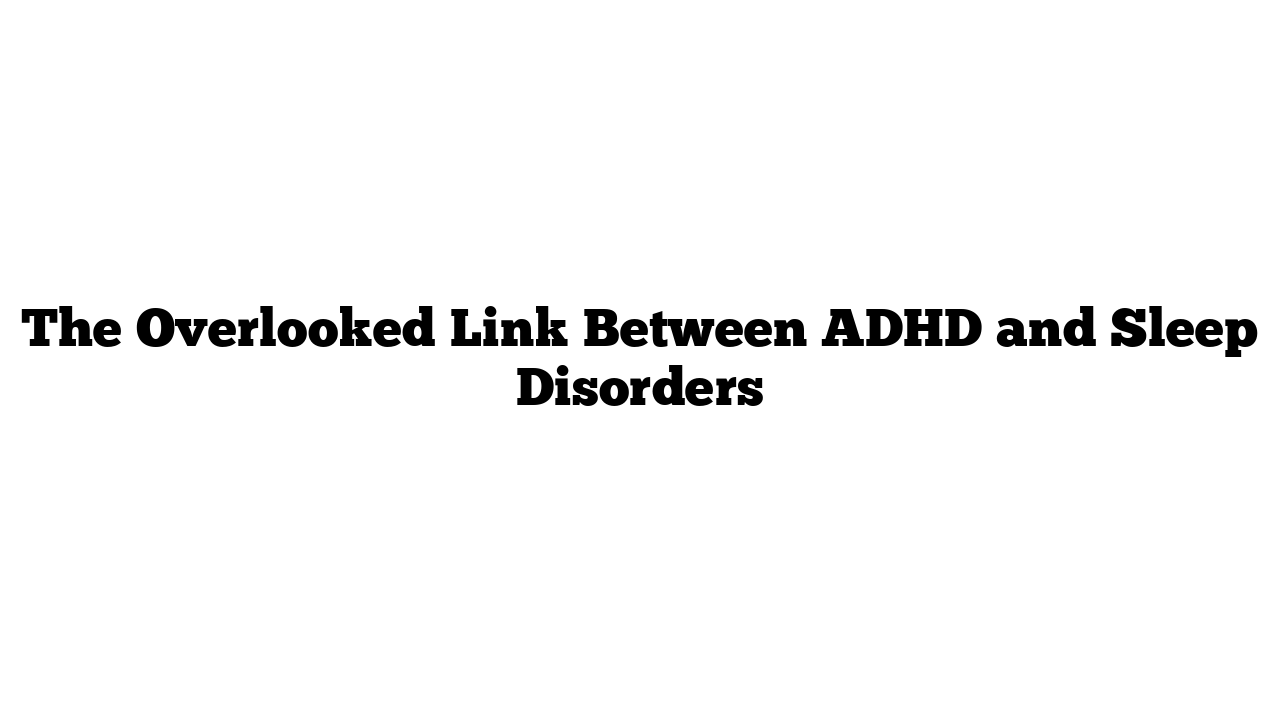Attention Deficit Hyperactivity Disorder (ADHD) affects millions of people worldwide, causing difficulty in maintaining attention and sometimes making daily life a challenge. But what if ADHD isn’t the only problem? Research shows a significant link between ADHD and sleep issues. In fact, the connection between sleep and ADHD is so intertwined that many researchers ask: Does ADHD cause sleep problems, or do sleep problems contribute to ADHD symptoms?
Let’s explore this fascinating relationship and uncover what current science has to say about it.
Understanding ADHD and Sleep: A Complex Relationship
ADHD isn’t just about trouble focusing; many people with ADHD struggle with sleep as well. Studies reveal that about 70% of children with ADHD face challenges with falling or staying asleep—a much higher rate than in the general population . For adults, it’s been found that approximately 78% have a delayed circadian rhythm, which affects when they feel sleepy, as opposed to only 20% of adults without ADHD .
This “delayed circadian rhythm” means that people with ADHD often experience events like tiredness or wakefulness later than usual. This can lead to shorter sleep durations, creating a cycle of tiredness, which only exacerbates ADHD symptoms.
How Sleep Deprivation Impacts ADHD Symptoms
Lack of quality sleep doesn’t just make focusing harder. For individuals with ADHD, it can lead to a range of day-to-day difficulties. For example, sleep-deprived children are often more prone to hyperactivity, impulsivity, and difficulty concentrating. Adults, too, may appear hyperactive as a way to keep themselves awake throughout the day.
Sleep Disorders Common in ADHD
People with ADHD are also more prone to certain sleep disorders, including:
- Sleep Apnea: Causes pauses in breathing during sleep, reducing sleep quality.
- Restless Leg Syndrome (RLS): Creates discomfort in the legs, leading to sleep interruptions.
These conditions only add to the struggles of those with ADHD, affecting their overall health and ability to function well during the day.
Is ADHD the Cause, or Is It the Result of Sleep Issues?
In psychology, there’s no clear answer yet. Some experts believe ADHD and sleep issues could be “bilateral comorbidities,” meaning they interact with one another. It’s possible that both sleep issues and ADHD symptoms share common biological causes, where each can worsen the other.
One 2010 study found that adults with ADHD who experienced hyperactivity had a stronger association with sleep-onset insomnia than those with primarily inattentive ADHD . This suggests that poor sleep may contribute to hyperactive behaviors as the body tries to stay alert.
The Role of Circadian Rhythms and Melatonin
Circadian rhythms control our sleep-wake cycles, syncing with the natural cycle of night and day. For those with ADHD, this rhythm often appears delayed by over an hour and a half compared to people without ADHD. A 2013 study measured melatonin levels in individuals with ADHD and found this delay in sleepiness, which pushed back their entire sleep cycle .
Researchers believe that people with ADHD may have an insensitivity to melatonin, the hormone that encourages sleep, or even a different response to changes in light.
Treatment Options: How Can We Help Manage ADHD-Related Sleep Issues?
Thankfully, there are ways to help manage sleep issues in those with ADHD. Studies have shown that correcting circadian rhythms can improve ADHD symptoms. One promising option is melatonin supplements. In a long-term study of 101 children with ADHD and sleep onset insomnia, 65% continued to use melatonin three and a half years later. Of those, 88% reported better sleep, while 71% noticed behavioral improvements .
Key Findings of Melatonin Study:
- Mood improvements were reported by 61% of children.
- 92% of those who stopped taking melatonin experienced a return of delayed sleep onset.
These findings suggest that ADHD-related sleep issues might have a biological basis, which melatonin can help to address.
Final Thoughts: Managing ADHD and Sleep
ADHD is a complex condition with numerous factors at play. While melatonin supplements can be helpful, other approaches to managing sleep, such as behavioral therapies or light exposure strategies, are also worth considering. Ongoing research continues to uncover more about how ADHD and sleep interact, showing us that the relationship between mental health and sleep is intricate.
For more insights on ADHD and mental health topics, be sure to visit medicaltimes.io. Sleep well and take care!
